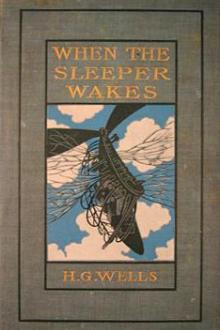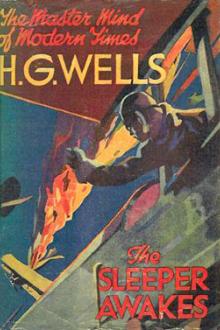The Sleeper Awakes<br />A Revised Edition of When the Sleeper Wakes, H. G. Wells [e novels for free TXT] 📗

- Author: H. G. Wells
Book online «The Sleeper Awakes<br />A Revised Edition of When the Sleeper Wakes, H. G. Wells [e novels for free TXT] 📗». Author H. G. Wells
“No,” said Asano, and glanced at him. “There is more than one.”
Graham felt unpleasantly helpless.
“I did not think,” he began and stopped abruptly. He went off at a tangent to ask for information about these Babble Machines. For the most part, the crowd present had been shabbily or even raggedly dressed, and Graham learnt that so far as the more prosperous classes were concerned, in all the more comfortable private apartments of the city were fixed Babble Machines that would speak directly a lever was pulled. The tenant of the apartment could connect this with the cables of any of the great News Syndicates that he preferred. When he learnt this presently, he demanded the reason of their absence from his own suite of apartments. Asano was embarrassed. “I never thought,” he said. “Ostrog must have had them removed.”
Graham stared. “How was I to know?” he exclaimed.
“Perhaps he thought they would annoy you,” said Asano.
“They must be replaced directly I return,” said Graham after an interval.
He found a difficulty in understanding that this news room and the dining hall were not great central places, that such establishments were repeated almost beyond counting all over the city. But ever and again during the night’s expedition his ears would pick out from the tumult of the ways the peculiar hooting of the organ of Boss Ostrog, “Galloop, Galloop!” or the shrill “Yahaha, Yaha Yap!—Hear a live paper yelp!” of its chief rival.
Repeated, too, everywhere, were such crèches as the one he now entered. It was reached by a lift, and by a glass bridge that flung across the dining hall and traversed the ways at a slight upward angle. To enter the first section of the place necessitated the use of his solvent signature under Asano’s direction. They were immediately attended to by a man in a violet robe and gold clasp, the insignia of practising medical men. He perceived from this man’s manner that his identity was known, and proceeded to ask questions on the strange arrangements of the place without reserve.
On either side of the passage, which was silent and padded, as if to deaden the footfall, were narrow little doors, their size and arrangement suggestive of the cells of a Victorian prison. But the upper portion of each door was of the same greenish transparent stuff that had enclosed him at his awakening, and within, dimly seen, lay, in every case, a very young baby in a little nest of wadding. Elaborate apparatus watched the atmosphere and rang a bell far away in the central office at the slightest departure from the optimum of temperature and moisture. A system of such crèches had almost entirely replaced the hazardous adventures of the old-world nursing. The attendant presently called Graham’s attention to the wet nurses, a vista of mechanical figures, with arms, shoulders, and breasts of astonishingly realistic modelling, articulation, and texture, but mere brass tripods below, and having in the place of features a flat disc bearing advertisements likely to be of interest to mothers.
Of all the strange things that Graham came upon that night, none jarred more upon his habits of thought than this place. The spectacle of the little pink creatures, their feeble limbs swaying uncertainly in vague first movements, left alone, without embrace or endearment, was wholly repugnant to him. The attendant doctor was of a different opinion. His statistical evidence showed beyond dispute that in the Victorian times the most dangerous passage of life was the arms of the mother, that there human mortality had ever been most terrible. On the other hand this crèche company, the International Crèche Syndicate, lost not one-half per cent, of the million babies or so that formed its peculiar care. But Graham’s prejudice was too strong even for those figures.
Along one of the many passages of the place they presently came upon a young couple in the usual blue canvas peering through the transparency and laughing hysterically at the bald head of their first-born. Graham’s face must have showed his estimate of them, for their merriment ceased and they looked abashed. But this little incident accentuated his sudden realisation of the gulf between his habits of thought and the ways of the new age. He passed on to the crawling rooms and the Kindergarten, perplexed and distressed. He found the endless long playrooms were empty! the latter-day children at least still spent their nights in sleep. As they went through these, the little officer pointed out the nature of the toys, developments of those devised by that inspired sentimentalist Froebel. There were nurses here, but much was done by machines that sang and danced and dandled.
Graham was still not clear upon many points. “But so many orphans,” he said perplexed, reverting to a first misconception, and learnt again that they were not orphans.
So soon as they had left the crèche he began to speak of the horror the babies in their incubating cases had caused him. “Is motherhood gone?” he said. “Was it a cant? Surely it was an instinct. This seems so unnatural—abominable almost.”
“Along here we shall come to the dancing place,” said Asano by way of reply. “It is sure to be crowded. In spite of all the political unrest it will be crowded. The women take no great interest in politics—except a few here and there. You will see the mothers—most young women in London are mothers. In that class it is considered a creditable thing to have one child—a proof of animation. Few middle class people have more than one. With the Labour Department it is different. As for motherhood! They still take an immense pride in the children. They come here to look at them quite often.”
“Then do you mean that the population of the World—?”
“Is falling? Yes. Except among the people under the Labour Department. In spite of scientific discipline they are reckless—”
The air was suddenly dancing with music, and down a way they approached obliquely, set with gorgeous pillars as it seemed of clear amethyst, flowed a concourse of gay people and a tumult of merry cries and laughter. He saw curled heads, wreathed brows, and a happy intricate flutter of gamboge pass triumphant across the picture.
“You will see,” said Asano with a faint smile. “The world has changed. In a moment you will see the mothers of the new age. Come this way. We shall see those yonder again very soon.”
They ascended a certain height in a swift lift, and changed to a slower one. As they went on the music grew upon them, until it was near and full and splendid, and, moving with its glorious intricacies they could distinguish the beat of innumerable dancing feet. They made a payment at a turnstile, and emerged upon the wide gallery that overlooked the dancing place, and upon the full enchantment of sound and sight.
“Here,” said Asano, “are the fathers and mothers of the little ones you saw.”
The hall was not so richly decorated as that of the Atlas, but saving that, it was, for its size, the most splendid Graham had seen. The beautiful white-limbed figures that supported the galleries reminded him once more of the restored magnificence of sculpture; they seemed to writhe in engaging attitudes, their faces laughed. The source of the music that filled the place was hidden, and the whole vast shining floor was thick with dancing couples. “Look at them,” said the





Comments (0)